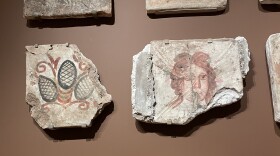
Davis Dunavin
ReporterDavis Dunavin loves telling stories, whether on the radio or around the campfire. An Edward R. Murrow Award-winning and Peabody Award-nominated journalist, he is the host of WSHU's Off the Path and created and hosted the 2022 series Still Newtown. He also teaches classes in media studies at Sacred Heart University. He started in Missouri and ended up in Connecticut, which, he'd like to point out, is the same geographic trajectory taken by Mark Twain.
-
Still getting over an ex? Norwalk’s Maritime Aquarium has a cure. For Valentine’s Day, name a cockroach, worm or fish after them and watch it fed to a lizard, turtle or seal.
-
Amid cold temperatures, Connecticut Department of Transportation officials cleared a homeless encampment beneath a New Haven overpass and filled in the area with boulders to prevent people from returning.
-
It’s believed that some of the oldest preserved depictions of Jesus Christ are from a town in Syria, abandoned nearly 2000 years ago. The paintings, on a rough stone wall, can be seen at the Yale Art Gallery in New Haven.
-
The Yale Art Gallery holds some treasures from an ancient city in Syria, where many religions flourished side by side, including a new one called Christianity. The city was attacked, abandoned, and then rediscovered by archeologists in the 1920s. But tragedy struck the city again, more recently, at the hands of terrorists.
-
Two people in Stamford have died from exposure, as Connecticut is held in the grip of extreme cold weather. This comes as the state is allocating funds toward emergency housing to fill the gaps left by the Trump administration.
-
Twenty-six children and educators died in the Sandy Hook shooting. Every year since then, advocates have marked the passage of time with a candlelight vigil at a church in Washington, D.C.
-
The ancient Syrian city of Dura-Europos was attacked and then abandoned nearly 2000 years ago. Then, in 1922, archaeologists uncovered its sacred religious art. Much of it is housed at the Yale Art Gallery in New Haven. WSHU’s Davis Dunavin visited the gallery for the series Off the Path. He found artwork that shows how religions blended and overlapped in the ancient world.
-
It’s believed that some of the oldest preserved depictions of Jesus Christ are from a town in Syria, abandoned nearly 2,000 years ago. The paintings, on a rough stone wall, can be seen at the Yale Art Gallery in New Haven.
-
State regulators voted against a proposed deal to sell Aquarion to the New Haven-based Regional Water Authority for $2.4 billion.
-
Winter is coming, and advocates fear that the Trump administration's cuts could force thousands more Connecticut residents into homelessness as federal housing aid is slashed by 70%.








